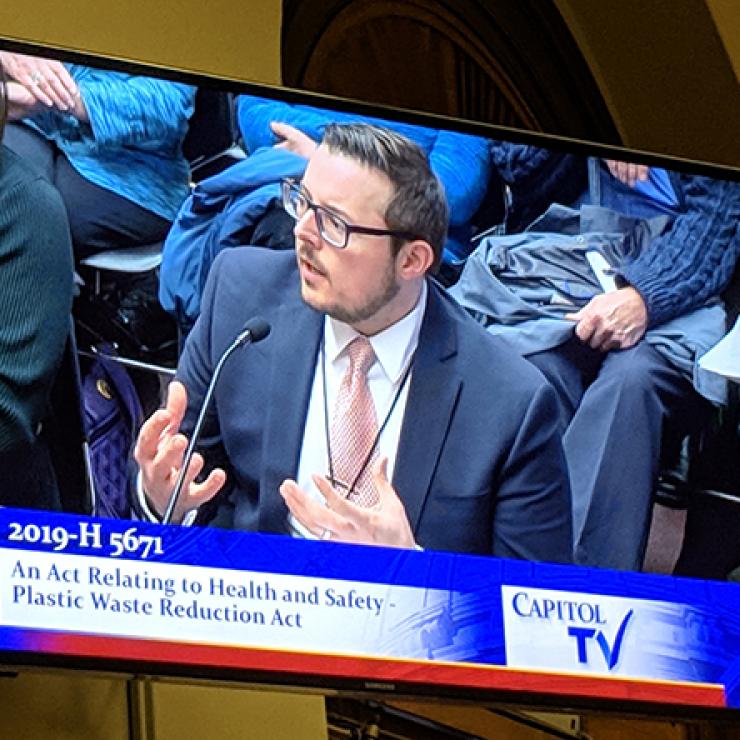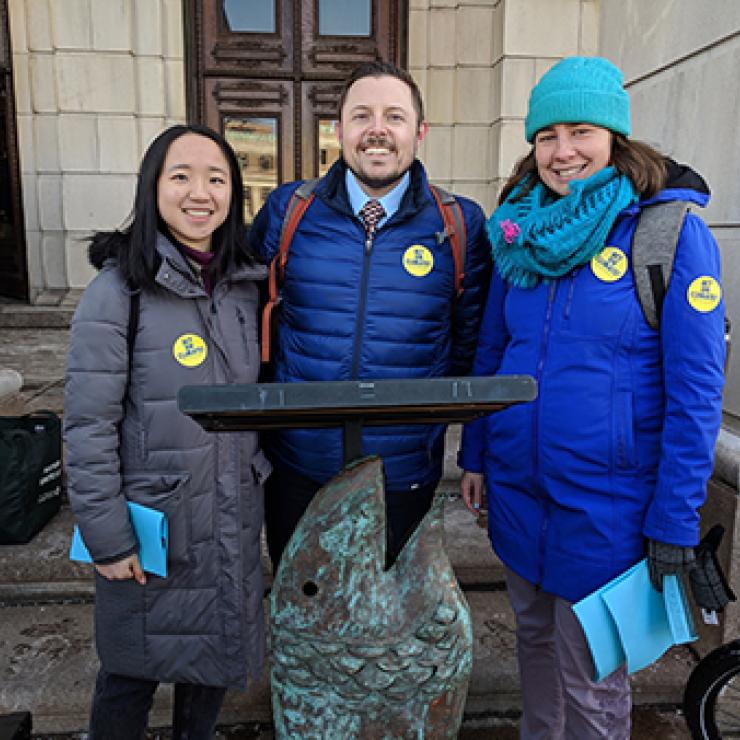In this issue
- PFAS: The Nonstick nightmare
- Massachusetts: Getting the lead out in Chelsea
- Massachusetts: Increasing solar access for low-income communities
- Massachusetts: Spring for Water
- Connecticut: Fighting for clean energy
- Connecticut: State Water Plan victory
- Rhode Island: Breakfast of Champions
- Rhode Island: Advocating for solutions to climate change and plastic pollution
- Download the PDF version
PFAS Chemicals: The Non-stick Nightmare
It’s in your pizza box, your sandwich wrapper, and — eek! — your chocolate cake. It’s PFAS and it’s not good. PFAS is short for polyfluoroalkyl or perfluoroalkyl substances. It is a class of chemical that makes products waterproof, stain-resistant, and grease proof. Sound too good to be true? It is.
While PFAS chemicals are effective at resisting water and fat, they are also persistent, bioaccumulative, and toxic. They are linked to increased risk of birth defects, testicular and kidney cancer, liver trouble, and high cholesterol. Worse, the companies that created and profited from these chemicals hid studies that highlighted the lifelong effects of PFAS on factory workers and their children. At the same time, these companies expanded the use of PFAS into so many products.
Created in the 1940’s, PFAS was first used on Teflon non-stick pans. Now, food packaging, textiles, carpets, and fire-fighting foam all contain what is now known as the “Teflon toxin.” Recently, Albertsons and Safeway products ranging from dental floss to instant popcorn were tested. The results were stunning, with eighty percent of products likely containing PFAS.
And what about the water? Even the most diligent and informed consumer is at the mercy of their local drinking water. There are currently 21 officially documented PFAS exposure sites and it is estimated that contaminated water systems are serving at least 190,000 Massachusetts residents.
Given the opportunity for exposure, it’s no surprise that 97% of people tested have been shown to have PFAS in their blood. We’re going to need to attack the problem from all angles: legislation, drinking water standards, and corporate campaigns. Let’s end the non-stick nightmare once and for all.
Connecticut
There hasn’t been much media attention on PFAS contamination in Connecticut — even though it was found in private well water in Greenwich. Clean Water Action supported a bill to restrict PFAS in firefighting foam for training that had the support of the Department of Energy and Environmental Protection, the Department of Public Health, environmental and water groups, firefighters, fire marshals and the CT Airport Authority. Unfortunately, despite this widespread support, the bill did not pass during the 2019 legislative session.
Clean Water Action will continue to work with the state procurement agency, municipalities, and the School Nutrition Association of Connecticut to raise awareness of exposures to PFAS from food packaging and food service-ware and hope to adopt restrictions at both the state and municipal levels. Clean Water is also organizing a conference on the health and environmental impacts of PFAS to be held this fall. If you would like more information, or are interested in volunteer opportunities, please contact Anne Hulick at ahulick(at)cleanwater(dot)org
Massachusetts
There is a simple way to stop this cycle of contamination in our food supply. Ban toxic PFAS chemicals from food packaging! Thankfully, Representative Jack Lewis (D-Framingham) and Senator Michael Moore (D-Millbury) introduced smart legislation to protect our health and our food from PFAS chemicals this session.
At the recent public hearing, Clean Water staff and allied scientist Kathryn Rogers of Silent Spring Institute spoke of the dangers of PFAS while Mark Rossi of Clean Production Action stressed that the chemicals are unnecessary, since safer alternatives exist for foodware. Senator Humason of Westfield is among the legislators on the Public Health committee. Westfield has been one of the towns most impacted by PFAS in drinking water, and Humason said “It’s everywhere! People in my community want their blood tested.”
What YOU Can Do: Call or email your Massachusetts state legislators and urge them to support the policies banning PFAS in Food Packaging HD3750/S1315.
Not sure which legislators represent your community? Find out here
Rhode Island
The Rhode Island state legislature is considering a bill that would address toxic PFAS chemicals in food packaging. It drew broad interest at recent public hearings before House and Senate committees.
Quotable quotes and heartfelt reasons why this class of chemicals should be kept out of the food packaging that we eat out of and give to our families:
Trina Lavoie, a mother, businesswoman and Savvy Women’s Alliance member from Woonsocket, RI, told the committees that she works hard to control the toxic chemicals that enter her home by choosing organic produce and natural cleaning and personal care products and believes she keeps about 80% of contaminants out of her families lives. She said “today, I am here asking that you help with the 20% I cannot control.”
Mike Bradlee, owner of a composting facility said “food packaging coated with PFAS will degrade but the PFAS agents will not decompose, but remain, concentrated in the final product…the persistence of PFAS could result in an increased risk of bio-accumulation as it is used on our farms and in our gardens and homes.” He fears that this contamination could ruin his business.
Now that legislators have heard about the dangers of PFAS they have the opportunity to protect Rhode Island families and pass this legislation that will prohibit the use of the chemicals in food packaging.
What YOU Can Do: Speak out in support of this common sense step to better protect our food and prevent exposure to PFAS chemicals here.
Massachusetts Updates
Getting the Lead Out in Chelsea
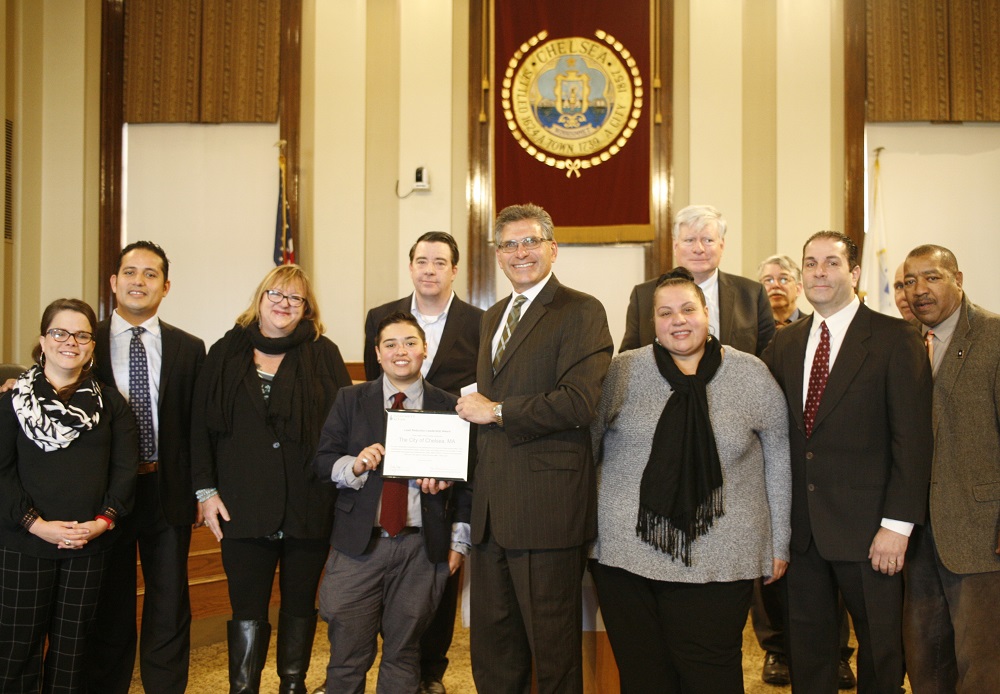
Last year, Clean Water Action launched a new drinking water program in Massachusetts focused on replacing lead service lines in under-served communities. Lead service lines are the pipes that bring water from the water mains to the building. While the prevalence of lead pipes are not unique to these communities, the cost of replacement for both the city and homeowner mean that is often low income communities and/or communities of color that are the last to be protected from lead in drinking water.
The City of Chelsea was among the first communities that Clean Water engaged. Chelsea, in collaboration with Clean Water and Chelsea GreenRoots, submitted and received a $100,000 loan from the Massachusetts Water Resources Authority to begin replacing lead services lines at no cost to the homeowner.
This early success in Chelsea demonstrates what is possible when a city commits to creative problem solving in collaboration with trusted community partnership. Clean Water was pleased to grant Chelsea the first of what we hope will be many Lead Service Line Replacement Leadership Awards.
June will mark the beginning of a bilingual youth-led community canvass that will educate Chelsea residents about lead in drinking water, teach residents how to check their homes for a lead service line, and ultimately create a comprehensive inventory that will guide the city’s replacement program moving forward. Because of this first year success, the City has committed to tripling its spending on lead service line replacement this coming year — expediting our goal of total lead service line replacement.
How to Get Solar Energy to Low-Income Communities

This year, Clean Water Action is more focused on increasing access to solar power than ever. Massachusetts is a clean energy leader, including development of solar and offshore wind, but those benefits don’t reach everyone. Though state law directs the Governor to incentivize solar projects for low-income customers, many households still lack access.
This is not just about affordable clean energy — solar power can save customers money and, sometimes, even help people earn money. How? It depends on when your system was built and what kind of customer you are.
Most people are familiar with basic rooftop solar, the most common residential option. With rooftop, money is subtracted from electric bills based on the energy produced by the panels. The company who made and installed the panels usually gets some part of the money, with the customer receiving the rest. This generally pays off the initial investment after 10 or 20 years. For example, if a homeowner installs solar panels for $20,000 and saves $150 on their electric bill, it would take 11 years to recover the cost of the panels. Any money saved after that is pure profit. Solar panels typically last 25 years, so the money earned could be significant.
Not everyone has $20,000, so accessing solar power can be a little more complicated for many. Lower income customers or renters who can’t put solar on their roof can “buy into” a big solar project and receive savings on their bills. This is called Community Shared Solar (CSS). It’s the main way low income households can access the benefits of solar energy. It avoids many upfront costs of solar panel installation. It also allows a pathway forward for customers who rent. This is the only option for a large percentage of Bay State residents.
Massachusetts’ solar program is called Solar Massachusetts Renewable Target (SMART). But it’s not working for many. The so-called “SMART” program has not resulted in any noticeable number of low income solar projects. Thankfully, there is opportunity to fix this, right now. The state’s Department of Energy Resources is currently reviewing the program and has been directed to put and extra emphasis on increasing low and moderate income solar access.
Two bills have also been filed in the state legislature that would expand access to solar by giving solar companies more flexibility in delivering savings to customers and carving out solar incentives for low-income projects Clean Water Action is working with the Green Justice Coalition to change the laws and regulations that block low-income communities and communities of color from accessing solar. Take action today at cleanwater.org/solar-ma to support solar for all of Massachusetts.
Thank you to all who attended and supported Clean Water Action’s Spring for Water Benefit!
Members and allies of Clean Water Action gathered on May 22nd at Carrie Nation Restaurant and Cocktail Bar in Boston to celebrate successes from the past year.
Connecticut Updates
Is Water Part of the Public Trust?
The Debate Over the State Water Plan
Connecticut’s State Water Plan, finalized in January 2018, was a historic achievement to coordinate the use, management, protection, and conservation of our water now and into the future. It was a consensus-based document from four state agencies and the Water Planning Council (Council), and numerous subcommittees. Over two years there was a robust and transparent stakeholder process, hundreds of meetings, the investment of one million dollars to engage expert consultants, and a final joint public hearing in April 2018. Public comments highlighting the importance of water as part of the public trust were referenced in the final plan. Clean Water Action participated in numerous meetings throughout the process and submitted comments to the docket and formal testimony at the April public hearing in support of the Plan.
Despite this, the Water Utilities and the Connecticut Business and Industry Association feared that including statements about water being part of the public trust in the State Water Plan might lead to heightened scrutiny, encroachment on their decision-making ability for managing water, and even legal challenges. Together, these powerful groups lobbied against the plan as it was written, and succeeded in getting the Committees to refrain from voting on the Plan in 2018. This sent the Plan back to the Water Planning Council for revisions and resubmission in 2019 — an unacceptable setback!
Thankfully former Governor Malloy stepped in and issued Executive Order No. 66, which required the implementation of the Plan and re-submission as-is to the General Assembly in 2019. After ongoing debate during the 2019 legislative session — but no substantive changes — the House passed the State Water Plan unanimously on June 4th, the Senate passed it on June 5th and Governor Lamont is expected to sign it.
This is truly a historic achievement for Connecticut! For the past two years, Clean Water Action actively worked with many other partners and policymakers to support passage of this bill. As we head into the summer months, the organization plans to celebrate this amazing accomplishment to protect our state’s waters!
Connecticut’s Fight for Energy Efficiency
In 2017, Connecticut’s General Assembly made a decision to raid $145 million dollars of energy efficiency and clean energy funds and to help solve a state fiscal crisis. These ratepayer funds, collected through a small surcharge on electric utility bills, are intended to support energy efficiency and clean energy projects in towns across the state. These projects lower energy consumption and waste, reduce reliance on fossil fuels, save residents money, and help cut carbon pollution while beginning to address the worst impacts of the climate crisis. In addition, these funds have supported 34,000 good paying jobs for business owners and contractors that provide direct services to residents and businesses across the state. The funds have contributed to the following:
— 236,789 tons of carbon emission reductions annually
— $42.7 million saved annually by residents
— A positive return on investment
— Energy efficiency benefits in CT were equivalent to taking two 45 megawatt power plants offline!
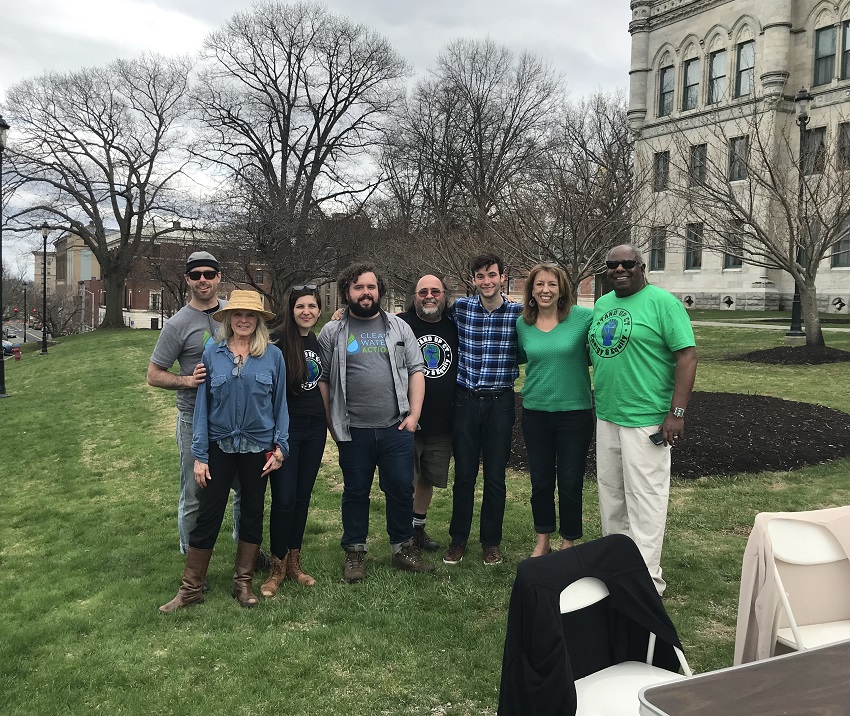
Clean Water Action was stunned by the shortsightedness of this decision and has raised awareness on the climate and economic impacts of this decision for the past year. Together with our Clean Water Action board member, and CEO of Energy Efficiency Solutions, Leticia Colon de Mejias, the organization participated in press events and rallies, educated policymakers and mobilized letters and calls to the Governor and legislators who were opposed to planned diversion of another $54 million dollars. Clean Water Action called on lawmakers to protect these funds for the future.
More than 1000 Connecticut residents signed a petition opposed the upcoming raid and Clean Water staff attended a rally in Hartford on April 14th. State director Anne Hulick spoke about the health, environmental and economic impacts of this decision.
Unfortunately, the Governor has not indicated willingness to stop the June diversion or publicly state that the funds will never be raided again. Despite this, Clean Water Action is proud to have made a significant impact and to have raised awareness about the critical value of energy efficiency as a pillar for achieving bold carbon reduction goals, drawing down energy waste and protecting health.
Rhode Island Updates
Celebrating champions at the Breakfast of Champions
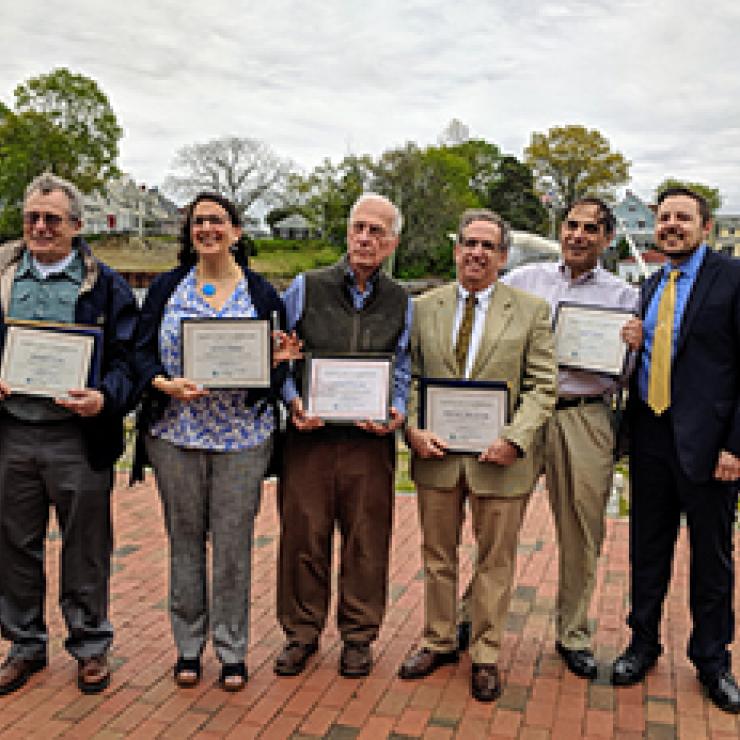
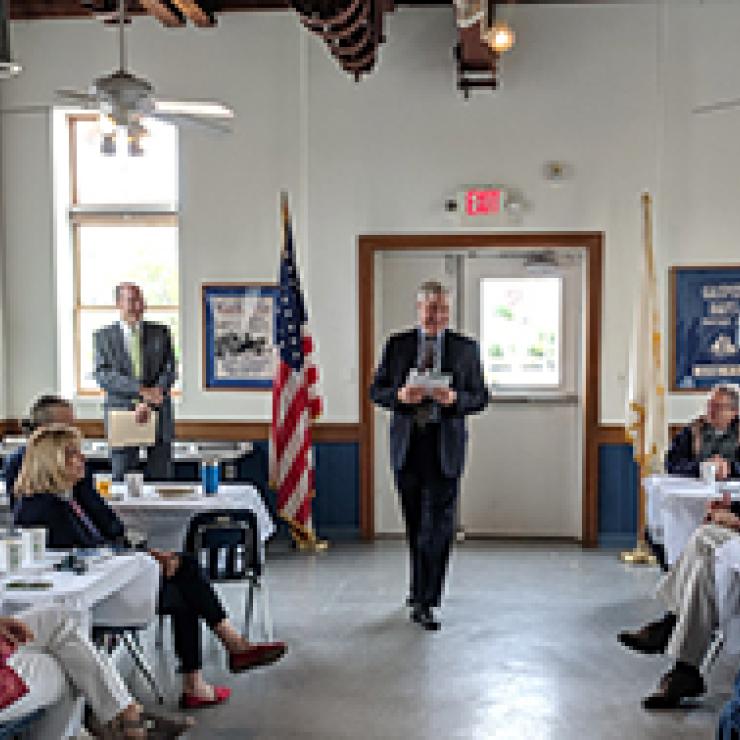
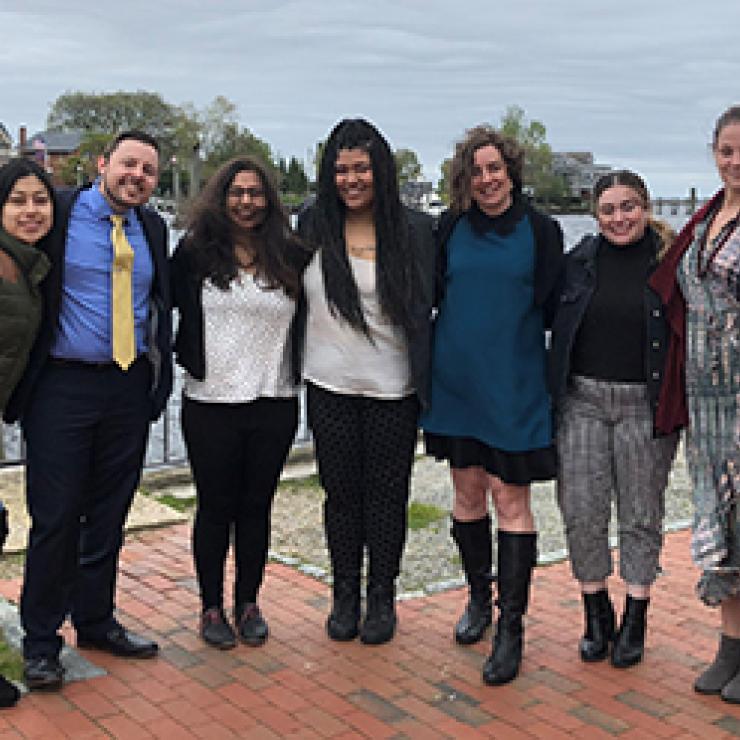
Rallying to act on climate and fighting to ban plastic bags in Rhode Island
